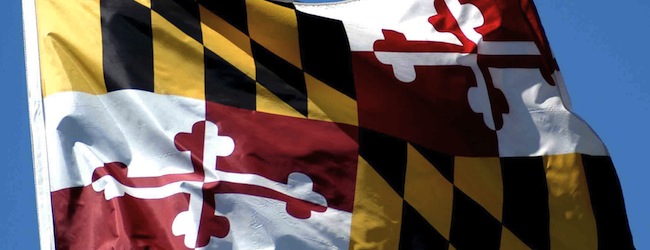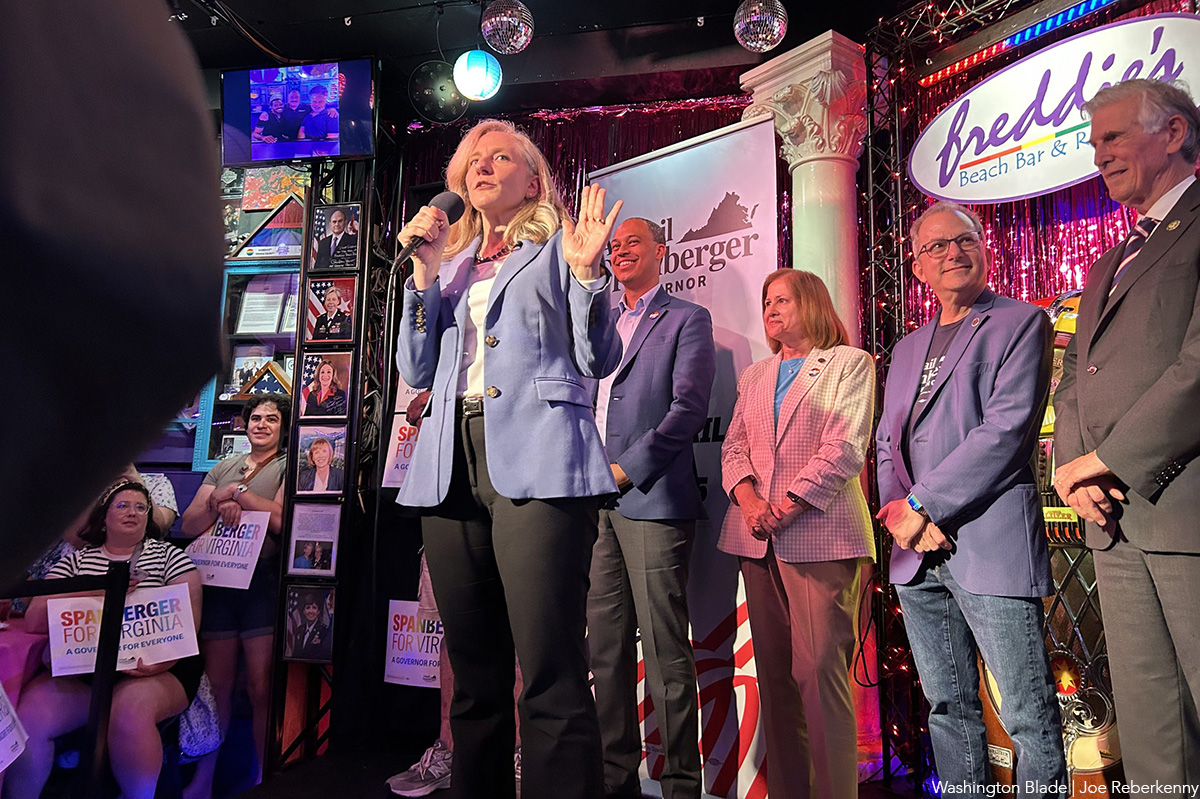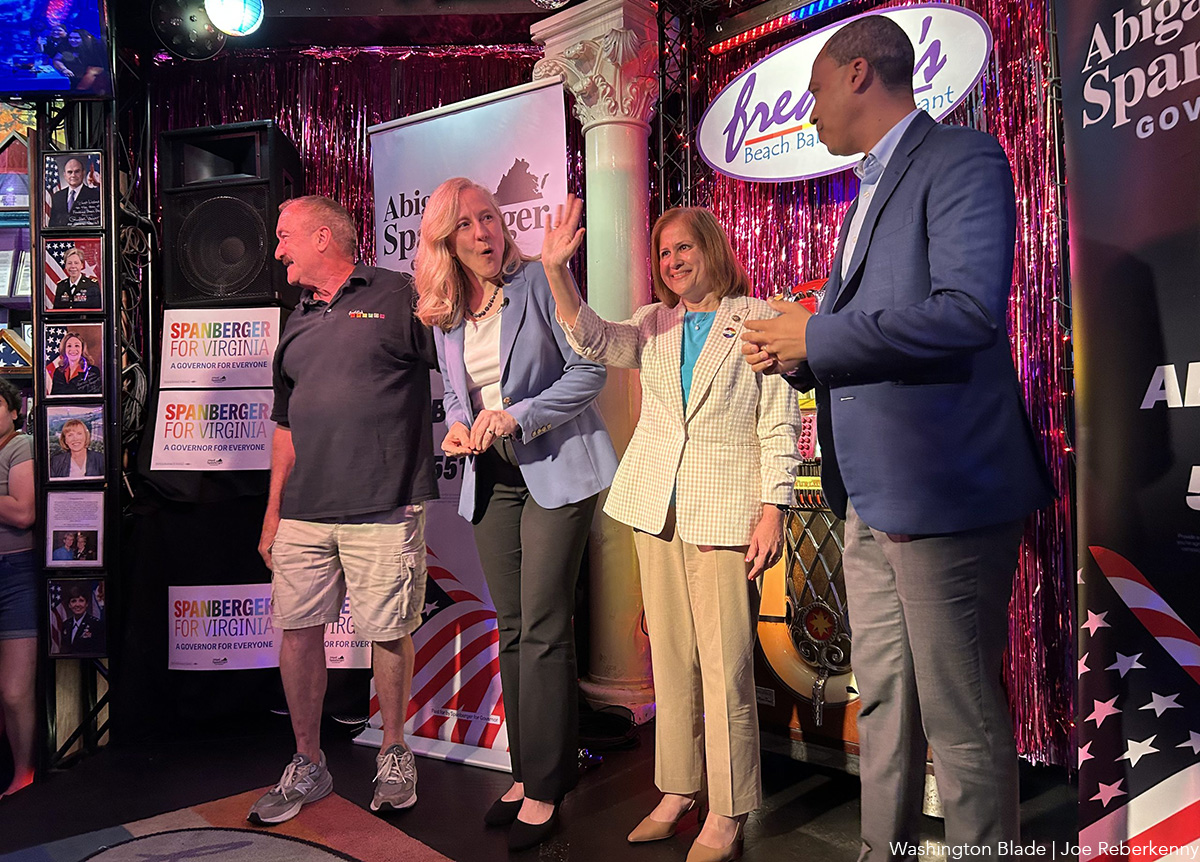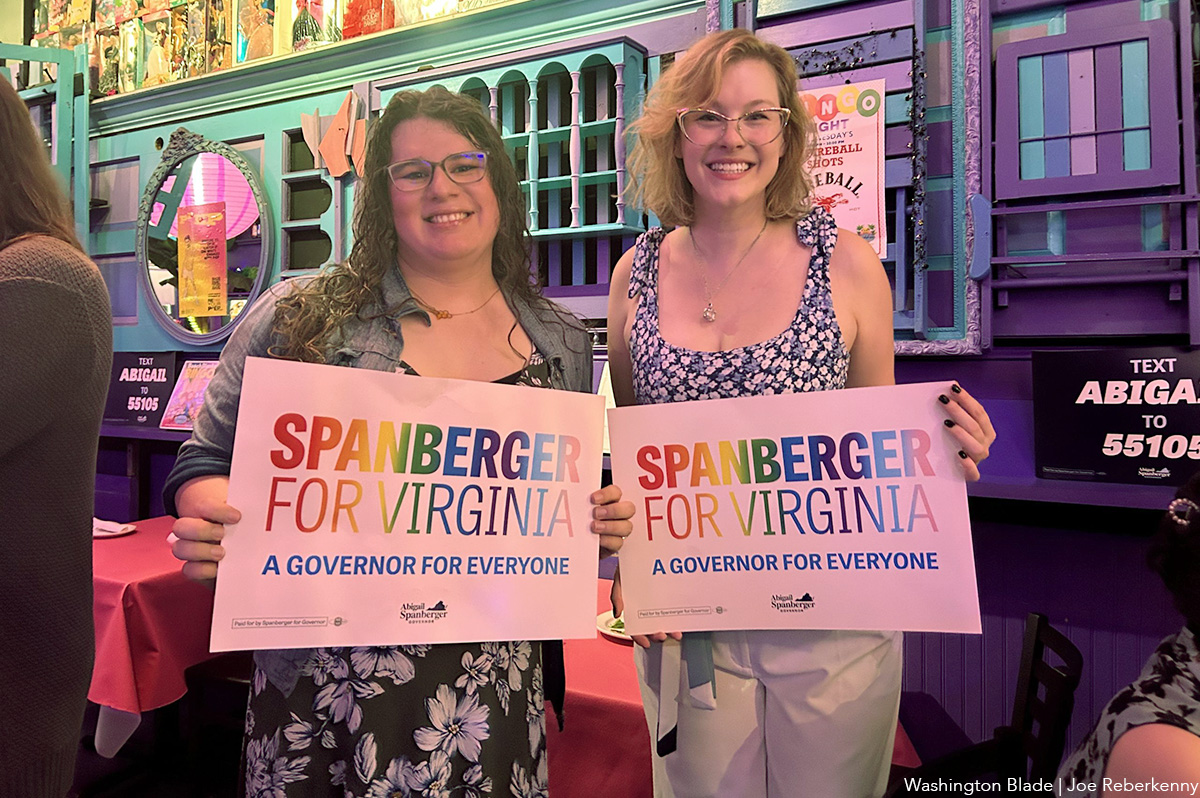Local
Marriage in Maryland?
Supporters optimistic, but 2012 referendum expected

Advocates for same-sex marriage in Maryland, including the seven gay and lesbian members of the state legislature, are optimistic that the legislature will pass a marriage equality bill in 2011 but they are less certain about the prospects for a transgender rights bill.
The gains in the number of supporters of a same-sex marriage bill in the November election and commitments by top leaders of the legislature to name marriage equality supporters to the committees that must clear them appear to have tipped the balance in favor of the bill passing, according to advocates and lawmakers.
“We remain cautiously optimistic that we’ve got the votes to push this bill through in this session, and that’s what we intend to do,” said Del. Heather Mizeur (D-Montgomery County), a lesbian.
News surfaced last week that the main bottleneck in preventing the bill’s passage during the past few years – its blockage in the state Senate’s Judicial Proceedings Committee – would be lifted when the legislature convenes in January. Changes in the committee’s makeup due to the election and a decision by one marriage equality opponent to move to another committee make it nearly certain that the committee will vote to send the bill to the Senate floor.
Meanwhile, the Judiciary Committee in the House of Delegates, which has been supportive of a marriage equality bill in the past, is also undergoing a major change in membership, and its composition won’t be disclosed until January.
But Mizeur told the Blade this week that Del. Mike Busch (D-Annapolis), who serves as Speaker of the House, has indicated to her and other gay and lesbian caucus members that he will make sure the committee’s pro-gay marriage majority is maintained.
“We didn’t meet with him as a full caucus,” Mizeur said. “But many of us individually have reached out to him. We kind of said it’s important that the Judiciary Committee’s open positions get assigned to people who are pro-marriage equality. And it’s been a very positive conversation.”
Morgan Meneses-Sheets, executive director of the statewide LGBT advocacy group Equality Maryland, said the now expanded LGBT caucus in the legislature, which climbed from four to seven following the November election, will also play a key role in helping to pass a marriage bill in 2011.
“They will do much of the heavy lifting,” she said.
Meneses-Sheets noted that everything must come together in just 90 days, beginning in January, during the three-month-long 2011 session of the Maryland General Assembly.
“I do think we can make this happen,” she said.
With head counts showing that the bill should clear the House of Delegates, both in committee and on the floor, and general consensus that it will clear the Senate committee, Meneses-Sheets said the next hurdle would be to overcome a filibuster on the floor of the Senate.
She said Equality Maryland and other advocates for the bill believe they have the 29 votes needed to stop a filibuster in the 47-member Senate. Once that hurdle is cleared, just 24 votes are needed to pass the bill in a direct floor vote.
Gov. Martin O’Malley told the Blade in an exclusive 2007 interview that he would sign a marriage equality bill; he reiterated that pledge during his successful campaign for re-election last month.
Meneses-Sheets said advocates for a pending transgender rights bill believe they have the votes to pass that measure in the House of Delegate if not the Senate, too. But similar to the gay marriage bill in past years, the main hurdle for the transgender measure is getting it out of committee in both the House and Senate, she said.
The bill would add the terms gender identity and expression to the categories included in an existing state civil rights law.
The General Assembly added sexual orientation protection to the state’s civil rights statute in 2001 under the administration of former Gov. Parris Glendenning.
“[The transgender bill] is where the committee assignments are even more important because it goes to the [House] Committee on Health and Government Operations,” she said. “It’s typically been a tough committee for us. They don’t deal with a lot of social policy bills like this one. So in the past, we’ve been short a good number of votes in order to get it out.”
Montgomery County transgender advocate Dana Beyer, who ran unsuccessfully in November for a seat in the House of Delegates, said she is more optimistic over the transgender bill, saying she believes LGBT allies in the General Assembly’s two bodies will help move the bill out of the two committees.
“I feel whatever has happened with the marriage bill should happen with the gender identity and expression bill,” Beyer said. “Mike Miller [president of the Senate] said he wants a floor vote on marriage. I feel that will apply to gender identity, too.”
Beyer said she’s confident that both the marriage and transgender bills will pass in the General Assembly in 2011, leading to yet another big hurdle for both measures: She’s certain that opponents will gather the required number of signatures to bring both bills before the voters in 2012 in separate referendums.
“I think we’re going to find ourselves with two Proposition 8s,” she said, referring to the California ballot measure that overturned that state’s same-sex marriage law.
Under Maryland law, bills passed by the General Assembly and signed by the governor are placed on hold if sufficient signatures are obtained to call a referendum on a measure.
A recent Washington Post poll showed that 46 percent of Maryland residents favor legalizing same-sex marriage, 44 percent oppose it and 10 percent had no opinion. Opponents of same-sex marriage, led by the anti-gay National Organization for Marriage, point out that voters have banned or overturned same-sex marriage laws in every state that such laws have come up on the ballot, even in cases where public opinion polls showed support for gay marriage.
Mizeur and Meneses-Sheets said the four out gay or lesbian incumbents in the General Assembly have lobbied their fellow lawmakers for the marriage bill in a low-key way in colleague-to-colleague discussions.
Two sources familiar with the caucus, who spoke on condition that they not be identified, said some LGBT activists have expressed concern that the caucus has not been aggressive enough in lining up more co-sponsors for the marriage bill. In particular, they expressed concern that Del. Maggie McIntosh (D-Baltimore City), the most senior LGBT caucus member and one of three delegates representing District 43 in Baltimore, has shied away from LGBT issues in her public statements and constituent mailings, including the same-sex marriage debate.
Noting that McIntosh is widely recognized as vying for the position of Speaker of the House when the post becomes vacant, one of the sources wondered whether she was backing away from speaking out publicly on the marriage bill to avoid generating opponents in a future quest for the speaker’s position.
“I absolutely disagree with that,” said Mizeur. “Maggie is as visible and vocal and supportive on our issues as any other member of the caucus.”
Mizeur added, “I do think that Maggie will make a great Speaker of the House and I would put money on the fact that she will be the next Speaker of the House. And she doesn’t play politics with the gay and lesbian community on changing who she is or how visible she would be on an issue in order to attain that goal.”
Voters in District 43, while re-electing McIntosh in November, also elected Mary Washington, the nation’s second black lesbian to win election to a state legislature and, like McIntosh, a supporter of the marriage equality bill.
But the district’s voters also have continued to elect same-sex marriage opponent Joan Carter Conway, also a Democrat, as their state senator. McIntosh has not stated publicly whether she has approached Conway to change her mind on the bill.
McIntosh and two other incumbent LGBT caucus members – Sen. Richard Madeleno and Del. Anne Kaiser, both Democrats from Montgomery County – did not return calls by press time.
The newly elected LGBT caucus members – Washington, and delegates-elect Luke Clippinger (D-Baltimore) and Bonnie Cullison (D-Montgomery County) – have each said they would work hard to secure the votes needed to pass the marriage bill.
Maryland
Silver Spring holds annual Pride In The Plaza
‘Today means inclusion. It means to build resilience’

Silver Spring’s annual Pride in the Plaza event took place on Sunday to celebrate the LGBTQ community and emphasize inclusion and resilience.
“Today means inclusion. It means to build resilience, love,” Robyn Woods, program and outreach director for Live In Your Truth, which organized the event, said. “I mean, just being surrounded by the community and so many great entrepreneurs, business owners, and just being a part of this whole rainbow coalition that we call the LGBTQIA to be about.”
With the event being her first time organizing for Live In Your Truth, Woods said she felt emotional to see the support and love at the event.
“Some people (are) bringing out their children, their babies, their grandparents,” Woods said. “It’s a lot more allies here than anything else. That type of support to me means so much more than just support from my community; just outside support, inside support, so much support around it, so much love. Everyone’s smiling outside, helping each other.”
Attendees of the event were able to head over to the Family Fun Zone, an air-conditioned Pride Cool Down Lounge, or watch live drag performances in the main stage area.
Along with entertainment and a shaved-ice stand, rows of information tables stood along the plaza, including FreeState Justice, the Washington Spirit, Trans Maryland, Moco Pride Center, and the Heartwood Program, an organization that offers support, therapy, education, and resources to the LGBTQ community.
“I want people to know about our services, and I love what we have to offer,” Jessica Simon, psychotherapist for Heartwood Program’s Gender Wellness Clinic, said. “I (also) want to be part of a celebration with the community, and so it feels good to be here with other people who have something they want to give to the community.”
She added that within today’s political climate, to which she called an “antidote to shame,” it’s important to be celebrating Pride.
“There’s a lot of demonization of LGBTQI people,” Siena Iacuvazzi, facilitator for Maryland Trans Unity, said. “(Pride) is part of the healing process.”
Iacuvazzi said she was taught to be ashamed of who she was growing up, but being a part of a community helped her flourish in the future.
“I was taught how to hate myself. I was taught that I was an abomination to God,” she said. “But being a community is like understanding that there are people who have experienced the same thing, and they’re flourishing. They’re flourishing because they’re willing to stand up for themselves as human beings and discover themselves and understand what’s true for themselves.”
She added that Pride allows for a mutual understanding to take place.
“It’s more of a sense of belonging … and just taking that home and understanding you’re not alone,” Iacuvazzi said. “We’re each taking our own journey — we’re not putting that on each other. It’s just walking away with a sense of belonging and humanity.”
Similar to Iacuvazzi, Woods said she hopes attendees’ biggest takeaways would be family, fun, resilience, and pride.
“Being proud of yourself, being happy for who you are, and representation and how much it matters,” she continued. “And I think all these young people that are walking around here get to see versions of themselves, but older. They get to see so many different lesbian, gay, bisexual, pansexual people that are successful, that are showing love, that care, and it’s not how we’re portrayed in the media. It’s lovely to see it out here. (It’s) like we’re one big old, happy family.”
Virginia
Spanberger touts equality, reproductive rights in Arlington
Democratic Va. gubernatorial nominee made campaign stop at Freddie’s Beach Bar

With the general election heating up and LGBTQ rights under increasing threat nationwide, Virginia gubernatorial candidate Abigail Spanberger brought her “Span Virginia Bus Tour” to Arlington’s Freddie’s Beach Bar for a campaign stop filled with cheers, policy pledges, and community spirit.
Spanberger, who served three terms in the U.S. House of Representatives from 2019 through early 2025 for Virginia’s 7th Congressional District, also served as a federal law enforcement officer specializing in narcotics and money laundering cases, and as a CIA case officer working on counterterrorism and nuclear counterproliferation.
Spanberger is running against Republican nominee Winsome Earle-Sears, the current lieutenant governor of Virginia, who said she was “morally opposed” to a bill protecting marriage equality in the commonwealth.
She was joined by other Democratic candidates and supporters: lieutenant gubernatorial candidate Ghazala Hashmi, attorney general candidate Jay Jones, Virginia state Sen. Adam Ebbin (D-Alexandria), and Congressman Don Beyer.

Freddie’s was packed wall-to-wall with supporters, many of whom wore “Spanberger for Virginia” shirts in the progressive Pride flag colors. In her speech, she made it clear that LGBTQ Virginians’ rights are on the ballot this year.
“I’m so excited to be here, and I am so grateful to the entire staff of Freddy’s for letting us overtake this incredible venue that is not just an awesome place to come together in community, but is a symbol to so many people of joy, of happiness, of community and of celebrating our friends and our neighbors,” Spanberger told the packed restaurant. “It is exciting to be here, and particularly during this Pride month, and particularly as we reflect on the 10-year anniversary of Obergefell and the reality that we still have so much work to do.”
“The reality is there are so many people who still would be inclined to take us backwards,” she said. “In this moment when we see attacks on people’s rights, on people’s humanity, on Virginia, on our economy, on research, on public education, on food security, on health care, on Virginians, on their jobs, on public service and on people — it can get heavy.”
“What it does for me is it makes me want to double down, because once upon a time, when I was talking to my mother about some horror show or sequence of activities coming out of a particular administration, she did not really have the patience to listen to me and said ‘Abigail, let your rage fuel you’ — and the conversation was over. And so I reflect on that, because, in fact, every day there is so much fuel to be had in this world and in this moment.”
One of the points Spanberger continued to emphasize was the importance of steadfast state government officials following the election of President Donald Trump, which has led to rollbacks of LGBTQ and bodily autonomy rights as a result of the conservative-majority U.S. Supreme Court.
“What the past few years have shown us is that a Supreme Court decision, no matter how many years we have celebrated its existence, does not protect us in the long term. And so as governor, I will work to make sure that every protection we can put in place for the dignity, the value, and the equal rights of all Virginians is a priority.”
During her speech, Spanberger highlighted several of the key values driving her campaign — protecting reproductive freedom and human rights, lowering healthcare costs, safeguarding Virginia’s environment, and ensuring that public education is affordable, accessible, and rooted in truth, not politics.
Spanberger went as far as to say that she wants to amend the state’s constitution to remove Section 15-A. “The reality is that in Virginia, we still have a ban in our state constitution on marriage equality. It is of the utmost urgency that we move forward with our constitutional amendment.”
“We will work to ensure that that terrible constitutional amendment, that was put in years ago, is taken out and updated and ensuring that Virginia is reflective in our most essential documents of who we are as a commonwealth, which is an accepting place that celebrates the vibrancy of every single person and recognizes that all Virginians have a place, both in that constitution and in law,” she added.
Following the event, two supporters spoke to the Washington Blade about why they had come out to support Spanberger.
“I came out because I needed to show support for this ticket, because it has been a particularly rough week, but a long few years for our rights in this country, in this state, with this governor, and it’s — we need to flip it around, because queer people need protection,” said Samantha Perez, who lives in Ballston. “Trans people need protection. Trans kids need protection. And it’s not gonna happen with who’s in Richmond right now, and we just need to get it turned around.”

“The whole neighborhood’s here. All our friends are here,” said Annie Styles of Pentagon City. “It means the world to me to take care of each other. That’s what a good community does. That’s not what we’ve had with the Republicans here or across the nation for a really long time. It’s time to show that care. It’s time to make sure that good people are in a position to do good things.”
District of Columbia
Activists protest outside Hungarian Embassy in DC
Budapest Pride scheduled to take place Saturday, despite ban

More than two dozen activists gathered in front of the Hungarian Embassy in D.C. on Friday to protest the country’s ban on Budapest Pride and other LGBTQ-specific events.
Amnesty International USA Executive Director Paul O’Brien read a letter that Dávid Vig, executive director of Amnesty International Hungary, wrote.
“For 30 years Budapest Pride has been a celebration of hope, courage, and love,” said Vig in the letter that O’Brien read. “Each march through the streets of Budapest has been a powerful testament to the resilience of those who dare to demand equality, but a new law threatens to erase Pride and silence everyone who demands equal rights for LGBTI people.”
“The Hungarian government’s relentless campaign against LGBTI rights represents a worrying trend that can spread normalizing division and hatred,” added Vig. “Thank you for standing with us when we refuse to be intimidated.”
Council for Global Equality Chair Mark Bromley and two of his colleagues — Stephen Leonelli and Keifer Buckingham — also spoke. Health GAP Executive Director Asia Russell and Chloe Schwenke, a political appointee in the Obama-Biden administration who worked for the U.S. Agency for International Development, and Planned Parenthood staffers are among those who attended the protest.
(Washington Blade video by Michael K. Lavers)
Hungarian lawmakers in March passed a bill that bans Pride events and allow authorities to use facial recognition technology to identify those who participate in them. MPs in April amended the Hungarian constitution to ban public LGBTQ events.
Budapest Pride is scheduled to take place on Saturday, despite the ban. Hundreds of European lawmakers are expected to participate.
“Sending strength to the patriotic Hungarians marching tomorrow to advance human dignity and fundamental rights in a country they love,” said David Pressman, the gay former U.S. Ambassador to Hungary, on Friday on social media.
Sending strength to the patriotic Hungarians marching tomorrow to advance human dignity and fundamental rights in a country they love. Szabadság és szerelem. My past remarks on Budapest Pride: https://t.co/y1QhA9QouA
— David Pressman (@AmbPressman) June 27, 2025
-

 U.S. Supreme Court4 days ago
U.S. Supreme Court4 days agoSupreme Court upholds ACA rule that makes PrEP, other preventative care free
-

 U.S. Supreme Court4 days ago
U.S. Supreme Court4 days agoSupreme Court rules parents must have option to opt children out of LGBTQ-specific lessons
-

 National5 days ago
National5 days agoEvan Wolfson on the 10-year legacy of marriage equality
-

 Congress5 days ago
Congress5 days agoSenate parliamentarian orders removal of gender-affirming care ban from GOP reconciliation bill










